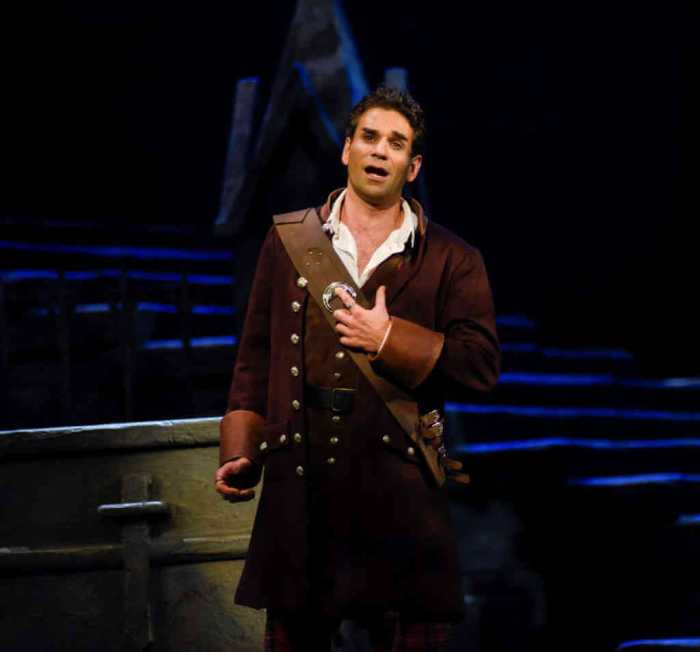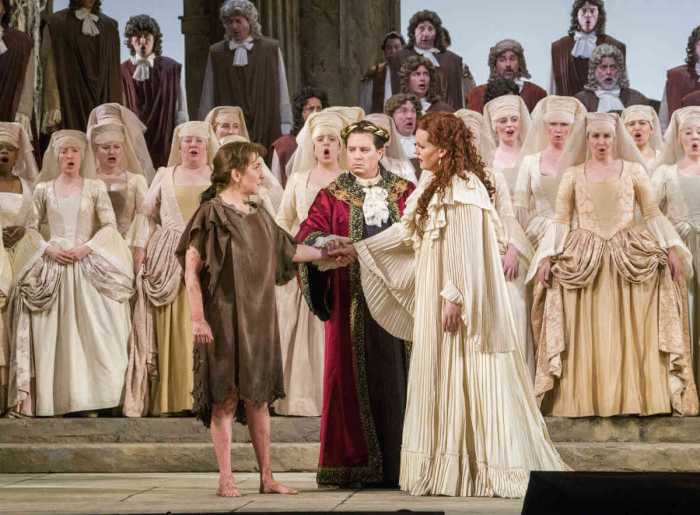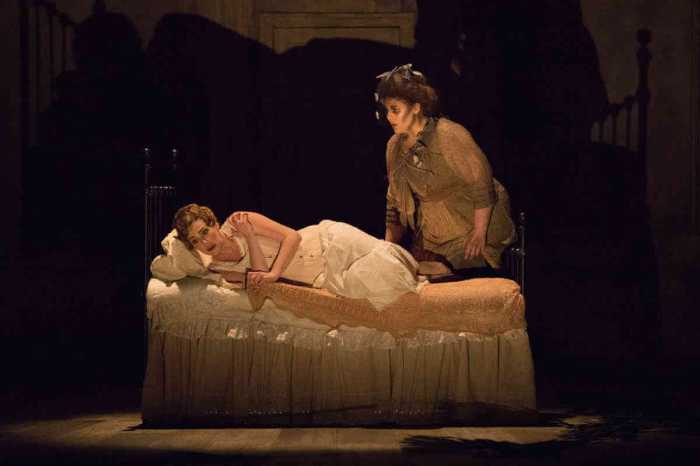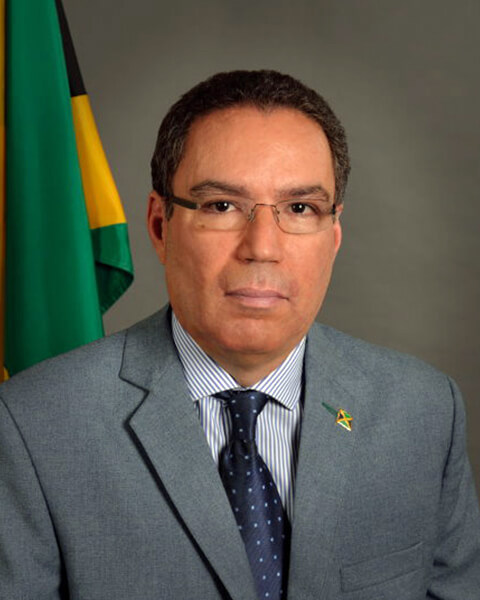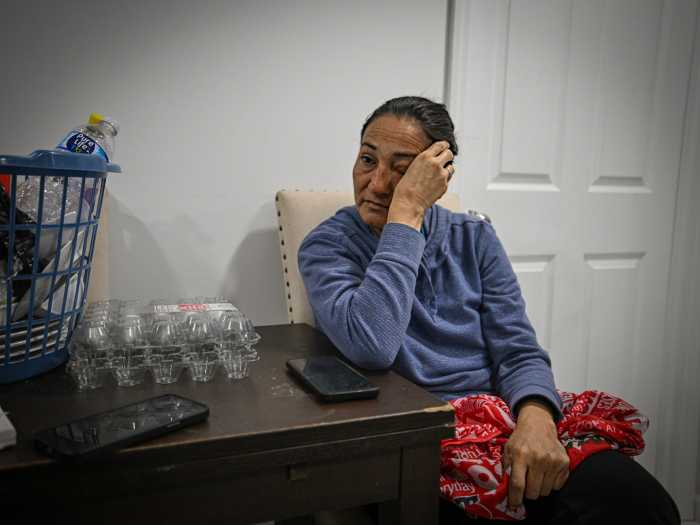BY DAVID SHENGOLD | Steven Blier –– the energizing genius behind New York Festival of Song — pulled off a fascinating “Schubert/ Beatles” evening December 8 at Merkin Hall. With typical generosity, Blier credited the inspiration to publicist extraordinaire Aleba Gartner and Juilliard’s wildly talented Wunderkind baritone, Theo Hoffman.
What binds Schubert and the Beatles? Boundless melodic inspiration, an underlying melancholy, ever only a modulation away, and short but astoundingly productive creative spans. Not all the juxtapositions worked, but some came off superbly. Blier places “yearning” as Schubert’s overall compelling principle; maybe this reads more poignantly to those gay mini-generations who relate to much of Schubert’s homosocial circle having been decimated by an STD.
Paul Appleby contributed much lovely singing, joining the expressive Sari Gruber in the ravishing “Licht und Liebe,” taking a moving lead on “Yesterday,” and joining baritone Andrew Garland for a same-sex “If I Fell.” Gruber’s successes included a gender-altered “Norwegian Wood,” suggesting a real psycho, and pairing with Garland on one of the great Lennon–McCartney collaborations, “She’s Leaving Home.”
Classical vocals around Manhattan
Hoffman’s vocalism and musicality astound –– his “Du bist die Ruh,” self-accompanied on guitar, topped a night of much fine singing. With more experience will come less need to demonstrate good fellowship onstage (red flag: singing with hands in pockets). Garland, formerly a master of artful posing, has edited out much of that, thus becoming a more satisfying performer: his deadpan embodying the “Taxman” was stellar. He’s not the heavyweight voice needed for “An Schwager Kronos,” however.
Michael Barrett accompanied the Lieder; Blier played for the Beatles tunes –– sometimes accompanied by Hoffman on guitar and genre-bending violinist Charles Yang, an astonishing talent, though for me his take on “Blackbird” destroyed the song’s compelling simplicity.
NYFOS, as often, stimulated much thought.
Manhattan School of Music has been investigating well-received American operas little revived after initial runs. December 9 brought Conrad Susa’s 1994 “The Dangerous Liaisons.” Set to a subtly wrought and strong libretto by Philip Littell, the piece premiered at San Francisco Opera with a stellar cast including Frederica von Stade, Richard Stilwell, the then-emerging Renée Fleming, Judith Forst, and Johanna Meier. All were accomplished in florid work, which leaves its traces on musical lines full of melisma. Tonal and best wrought in ensembles, Susa’s music sometimes functions basically as underpinnings to Littell’s smartly rendered “opening out” of an epistolary novel. One major quibble: the double frame-death scene of Tourvel and Valmont is in principle well devised; in practice it just goes on too long, approaching Werther’s interminable expiring in length.
Dona Vaughn’s fluid, well-inflected production in Erhard Rom’s flexible set helped avoid stasis in the letter-writing scenes. The young cast moved well in (sometimes approximate) period costume and looked at home in convincing wigs — something not to be taken for granted. Most also delivered the text clearly, especially the leading partners in conniving: the splendidly capable Anna Dugan (Merteuil), gifted at word painting, and Timothy Murray, more boy-next-door than ladykiller as Valmont but a good lyric baritone. The high, almost veristic extremes of Tourvel–– an early “victim” part for Fleming’s gallery, reflecting her stellar top –– tested Abigail Shapiro, as it surely would any conservatory student; she coped reasonably withal. Noragh Devlin and Brittany Nickell made the matriarchs Rosamunde and Volanges vocally and dramatically substantial. Janet Todd and Oliver Sewell brought increasing conviction to the tough roles of the schemers’ young seducees. Most striking vocally among the others was baritone Michael Gracco (Bertrand).
Attending to singers’ audibility, George Manahan led with assurance a student orchestra that betrayed both high capacity and some opening night less-than-perfect ensemble. MSM sensibly employed Randol Bass’ reduced orchestration of an intriguing work that certainly warrants occasional revival.
On December 11, the Met’s “La donna del lago” –– new in February — returned, perhaps a season too early to pull in many patrons. It’s certainly not the best serious opera Rossini wrote (“Guillaume Tell” is apparently on the Met’s docket, as “Maometto II” and “Mosé in Egitto” should be) — but it has a few delightful numbers and a stellar final scene, in which Joyce DiDonato brought down the house. The Walter Scott-based work allowed us to hear three great Rossinian singers, DiDonato, Lawrence Brownlee, and John Osborn.
Elena, the titular Lady of the Lake (a body of water nowhere in evidence onstage) suits DiDonato extremely well; her personal radiance makes the needlessly gloomy production work. Ever the exacting bel cantist, she honors Rossini’s cadenzas as written. Brownlee –– his disguised King James V a much more ardent, less self-delighted fellow than Juan Diego Flórez presented –– sang phenomenally, especially in his Act Two scena. (Both Brownlee and Flórez command this part utterly; to me the American’s timbre ingratiates more.) Osborn’s undulcet but exciting, stylistically honed tenor — ideal for macho pig Rodrigo — was in much better form this run. Daniela Barcellona, still unfortunately styled and costumed, also sang better, with more volume in the middle if a glassy, sometimes approximate top. Owen Gradus, unworthy of his assignment (Douglas) in February, remained so; the Met has good basses but somehow we often don’t hear them.
Michele Mariotti knows his business; his conducting certainly brought out more color and drama than Kevin Knight’s dull, subpar sets and the capable Paul Curran’s surprisingly numbing direction of crowds.
Musica Sacra’s annual “Messiah” at Carnegie Hall took place December 22 under music director Kent Tritle. Even just having heard a starry Philadelphia Orchestra performance, this was something special. Tritle’s relatively small (32-member) chorus sang with superb clarity, dynamics, and balance; he captures the choruses’ architecture like few conductors today. The orchestra also shone, especially concertmaster Jorge Ávila, cellist Arthur J. Fiacco, and trumpeter Scott McIntosh.
Kathryn Lewek impresses me more each time I hear her; her liquid soprano carried beautifully and she sang with feeling if sometimes with rather operatic cadenzas. Someone cast this remarkable voice as Constanze, please!
Countertenors rock, but most of the weighty alto solos here suit mezzos far better. Christopher Ainslie showed his musicality in rather insistent decoration, but his timbre showed beauty only at its softest; neither projection nor breath length seemed sufficient. Mingjie Lei’s sweet tenor coped well with the varied tenor assignments; words and line were always clear, breath control notable.
Bass Matt Boehler sounded extremely impressive in the agility-testing solos, and he really sang off the text. He, Lewek, and the chorus won special cheers.
David Shengold (shengold@yahoo.com) writes about opera for many venues.



